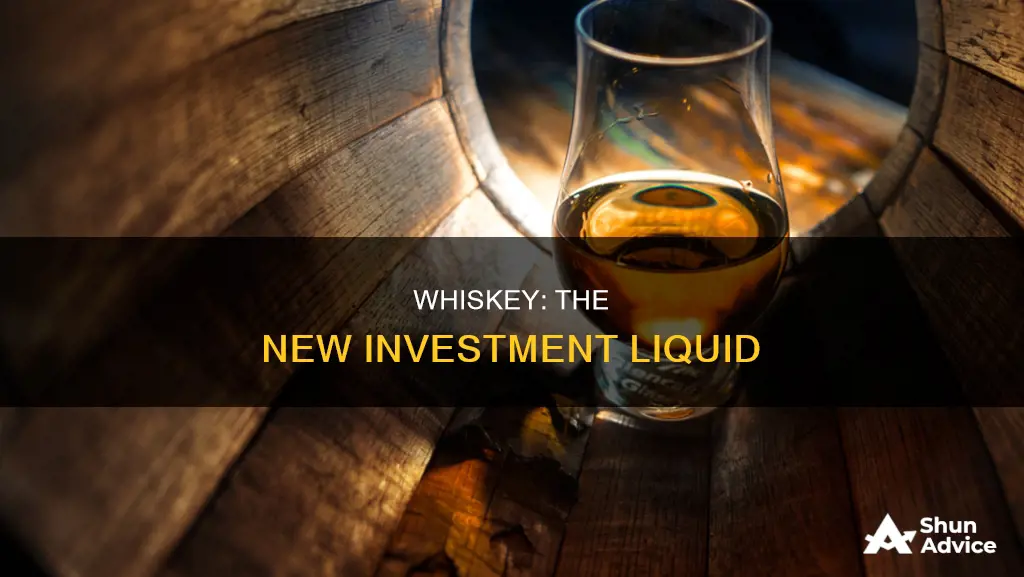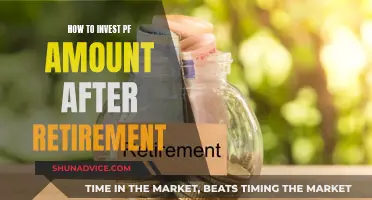
Whisky can be a profitable long-term investment, but it's not as simple as buying a random bottle and waiting for buyers to come knocking. There are two main routes into whisky investment: buying whisky by the bottle or by the cask.
When investing in whisky bottles, it's important to buy the right bottles—usually limited releases from iconic distilleries. Rare whiskies are the most likely to increase in value. For example, a bottle of Johnnie Walker Masters of Flavour was on sale for $24,000 in early 2023, while other bottles have sold at auction for upwards of $6 million. However, bottles are fragile and liquor evaporates even through a sealed cap, so storage requirements and upkeep can be costly and time-consuming.
An alternative way to invest in whisky is by buying it by the cask. This involves purchasing whisky in casks from a distillery while it's still in the early stages of the maturation process. The idea is that investors buy a cask with the aim of watching the spirit inside appreciate in value over time as it gets older and rarer. Cask whisky investing can be done directly via a distillery or through a specialist broker or investment club. However, it's important to note that not all casks will turn out well, and there are costs associated with storage and bottling.
What You'll Learn

Buy bottles of whiskey with the hope of selling them at a higher price
The most common way to invest in whiskey is by purchasing bottles directly. The key is to buy the right bottles, usually limited releases from iconic distilleries. Single-malt Scotch makes up the majority of the market, as investors tend to avoid blends of malt and grain whiskies.
Rare Whisky 101 publishes data and intelligence aimed at whisky collectors and investors. Its Rare Whisky Icon 100 index charts the value performance of iconic collectables and tracks the market for highly desirable, regularly traded bottles of single malt Scotch whisky. Since the index was launched in 2013, it has returned just over 400% until the end of June 2022.
Whisky investors tend to favour certain flavours, which can affect the price a bottle ultimately fetches. For example, whiskies aged in sherry barrels and darker varieties tend to sell well.
When investing in whiskey bottles, you'll need to know how to differentiate an authentic bottle from a fake one. You'll also need to be prepared to pay a hefty price for the best bottles and ensure they are insured. Proper storage is essential, in a dark location away from sunlight, with a temperature between 15°C-20°C (59°F-68°F) and monitored humidity. Bottles should be stored upright but flipped a couple of times a year to prevent the cork from drying out.
When it's time to sell, you can do so through auctions, to brokers, or in private sales.
Risks and Drawbacks
Investing in whiskey bottles can be costly, and there is a risk of losing money if you buy the wrong bottles or are unable to find a buyer. Bottles are fragile and liquor evaporates even through a sealed cap. There are also storage requirements and upkeep costs. You will have to deal with shipment and assessment (which costs extra money), and pay money to sell the bottles. The value of whiskey bottles is volatile, determined by literal taste as well as fashion.
Investments: Unlocking the Payout Potential
You may want to see also

Buy whiskey by the cask
An alternative way to invest in whiskey is to buy it by the cask. The whiskey distilling process is both labour and capital-intensive, and distilleries need to cover these costs. Bearing in mind the minimum three-year maturation rule that applies to Scotch whisky, distilleries raise capital by allowing private investors to buy whiskey casks in their store rooms.
The idea is that investors buy a cask with the aim of watching the spirit inside appreciate in value over time. The older a whiskey gets, the more expensive it becomes, thanks to the taste improving with age and the increasing rarity factor.
Cask whiskey investing can be done while the spirit is still in an early stage of the maturation process, and can be carried out directly via a distillery or through a specialist broker or investment club. A broker typically strikes a deal with a distillery for a limited run of casks at a discounted price. The broker then sells the casks, which are stored in a secure bonded warehouse and insured, to investors.
When buying whiskey as a cask investment, check that the broker has the required tax licence relating to the country in which the casks are being stored. In Scotland, HMRC keeps a record of who owns and stores each cask to ensure tax is paid when it is time to sell the whiskey. The Irish Revenue Commissioners perform a similar function in Ireland.
There are several advantages to investing in whiskey casks as opposed to traditional investments such as stocks and shares. Whiskey is not directly tied to any financial markets and so is not as significantly affected by economic recessions. Whiskey casks are also asset-backed, with investors purchasing a tangible commodity. The value of the whiskey is largely determined by its age and brand and will increase over time.
However, there are some risks to investing in whiskey casks. Demand could slow down and prices could drop. There could be an oversupply in the market. Rules and regulations could change, requiring investors to seek new licences to sell. Alcohol could become outlawed in certain countries. There could be an outbreak of major conflicts, which could create difficulties for global exports.
Tips for buying whiskey by the cask
- When buying whiskey by the cask, it is important to remember that this is a long-term investment. For any kind of meaningfully good whiskey, you should expect to hold the barrel for at least two or three years.
- In every batch of whiskey, some barrels go bad. Others turn out fine but are nothing special.
- The distillery will charge you for storage and bottling.
- Do your research. Learn about the history of whiskey as a whole, as well as individual bottles. Invest in bottles that are likely to hold their cultural value as well as their flavour.
- Be prepared to sit on your purchase for years. It may take a long time for any given bottle to appreciate in value.
- Make sure you understand how you will make money from investing in whiskey.
- Be comfortable with the level of risk.
- Know your budget and how much you can afford to lose.
- Be financially protected should things go wrong.
Should You Sell Investments to Pay Off Your Mortgage?
You may want to see also

Invest in whiskey stocks and funds
If you’re looking for an easier, less complicated method of investing in whiskey, you might want to consider whiskey stocks and funds. These are extremely accessible – you can simply open your investing app, find the right ticker, and purchase the number of shares you require.
However, it's worth noting that virtually all whiskey-related stocks are not "pure plays", meaning you're investing in more than just whiskey. For example, Johnnie Walker maker Diageo (DEO) is also involved with Captain Morgan rum, Don Julio tequila, and Guinness. Even Jack Daniel's parent company, Brown-Forman (BF.B), which is a whiskey company first and foremost, sells other spirits, including tequila and vodka.
There are also no direct whiskey funds. The closest you can get are diversified funds like the USA Mutuals Vice Fund (VICEX), which holds numerous spirits names, as well as tobacco companies, beermakers, and defence contractors.
Whiskey stocks and funds can be influenced by the broader stock market, so their performance may be impacted even if whiskey sales are strong.
Uncertainty's Impact: Navigating the Complex Relationship Between Risk and Investment
You may want to see also

Invest in whiskey through an online platform
If you want to invest in whiskey but don't want to deal with the hassle of buying, storing, and selling physical bottles or casks, consider using an online platform. These platforms offer more direct exposure to whiskey casks and bottles while making the process easier and more affordable.
- Vinovest: This platform is well known among alternative-investment fans and offers access to American whiskey and Scotch whisky brands such as Benriach, Highland Park, The Macallan, The Ardmore, and Lagavulin. Vinovest allows you to invest in whiskey for as little as $300, although it only deals in whole casks and not fractional cask ownership or bottles. They handle authenticating, storing, and insuring your casks, and provide guidance in picking the best ones. When it's time to sell, they will help find buyers and negotiate the best price. Vinovest also offers perks such as whiskey facility tours, virtual tastings, and the ability to blend and bottle your barrel for consumption.
- Vint: Vint is another platform that offers investments in American whiskey and Scotch whisky, allowing investors to buy fractional shares of "blue-chip" bottles and emerging investment-grade beverages. Vint sources, transports, insures, and stores the whiskey until it's time to sell, at which point they find qualified buyers. The minimum investment on Vint is $2,500, and they charge a one-time sourcing fee that varies between 0% and 35% of the gross offering proceeds. They also invest alongside shareholders, demonstrating their confidence in the investments they offer.
Online platforms provide an accessible way to invest in whiskey, offering benefits such as experienced guidance, tasting events, and distillery tours. However, it's important to remember that whiskey investing, like any other investment, carries risks and requires research to make informed decisions.
Shares: Picking Winners
You may want to see also

Understand the risks of investing in whiskey
As with any investment, there are risks involved when investing in whiskey. Here are some key points to consider when evaluating the risks of investing in whiskey:
Market Price Fluctuations
The market price for whiskey can fluctuate, and there is no guarantee that the value of your investment will increase over time. The whiskey you are maturing may lose value, affecting your potential returns.
Liquidity and Saleability
There is a risk that your whiskey becomes difficult to sell. This can happen if it becomes too old or too scarce, making it less desirable for blending or bottling as a single malt. Finding buyers for specific bottles or casks can be challenging, and you may struggle to liquidate your investment if needed.
Physical Risks
Whiskey, as a physical asset, faces risks of theft, destruction, or damage. Storing whiskey in warehouses or bonded warehouses carries the risk of loss or damage to the product. Insurance policies can provide some protection, but the actual payout may not meet your expectations or cover your losses entirely.
Insolvency and Business Risks
When investing through a company or platform, consider the risk of that entity becoming insolvent or ceasing operations. Understand how your investment is protected in such scenarios, and review the relevant safety information provided by the platform.
Information Asymmetry
The whiskey market, particularly for casks and aging whiskey, can be opaque and challenging to navigate. It requires experience and knowledge to assess the value and investment potential of a cask accurately. Asymmetric information can put investors at a disadvantage, and it's crucial to do thorough research or seek expert advice.
Inauthentic or Stagnant Stock
The whiskey investment market is largely unregulated, and there is a risk of encountering inauthentic or counterfeit bottles. Additionally, there is a possibility of stagnant stock, where certain bottles fail to appreciate in value or become difficult to sell, affecting your ability to realise returns.
Storage and Associated Costs
Investing in whiskey often involves considering storage costs, especially if you plan to hold the whiskey for an extended period. These costs can impact your overall returns, and you should factor them into your investment strategy.
Regulatory and Tax Considerations
Different countries have specific regulations and tax implications for whiskey investments. For example, Scotch whiskey must be matured and bottled in Scotland to maintain its designation and high value. Understanding the relevant tax liabilities and potential changes in regulations is essential for managing your investment effectively.
Diversification
Whiskey, as an alternative investment, should ideally represent only a small fraction of your overall investment portfolio. Diversifying your investments across various asset classes, such as cash, bonds, and shares, helps to mitigate the risks associated with any single investment type.
Savings, Investments, and Student Loans: Navigating the Tricky Triangle
You may want to see also
Frequently asked questions
There are several different ways to invest in whiskey, including buying whiskey casks, bottles, stocks and funds, or through an online platform.
Investing in whiskey casks can be a more direct way to invest in whiskey, but it is important to consider the distillery, the type of whiskey and wood being used, the size of the cask, and the desired length of investment. Investing in whiskey casks can be costly and may require a long-term commitment.
Investing in whiskey bottles can be less daunting than investing in casks, as they are easier to store and more cost-efficient. However, it is important to research the market value and authenticity of the bottles, and proper storage conditions are essential.
Investing in whiskey stocks and funds is a more accessible and less complicated method, but it is important to note that these investments are not "pure plays" and are influenced by the broader stock market.







